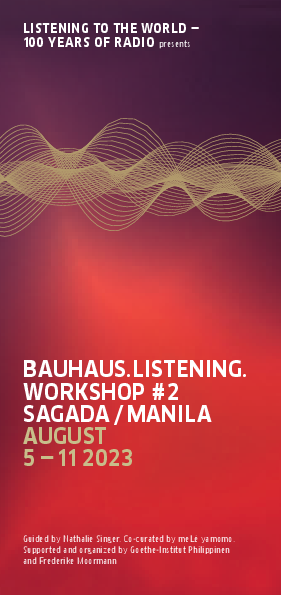From colonial radio infrastructure in Java to the role played by radio during the 2021 coup in Myanmar, to 100 years of radio in Philippines to the history of late-night radio programme in Vietnam - Southeast Asia has a variety of stories to tell about radio. The second Bauhaus.Listening Workshop will focus on, among other topics, the restitution of sound archives whose sound recordings are still mostly in Europe. How should this intangible cultural heritage be handled? How can and should it be returned?
The spotlight will also be on different tuning systems. Determining the pitches of musical instruments works according to different sets of principles everywhere, but they all have transnational cultural histories. The musicians among the workshop participants will be bringing their instruments along and testing them in practical demonstrations.
The Bauhaus.Listening Workshop #2 Sagada/Manila will host diverse professional ›ears‹ of Vietnam, Myanmar, Indonesia, Malaysia, Sri Lanka and the Philippines. Sol Trinidad and Dayang Yraola, for example, will address the complexity of listening from an ethnomusicological perspective during their Listening Walk. Devana Senanayake will be discussing how to listen to queer Southeast Asian voices with the participants of the workshop. Rani Jambak will examine radio history with her »Radio in the Independency 1945« presentation and Anjeline de Dios will explore listening through her sound massages. The evening programme is also jam-packed: For example, filmmaker and sound artist Riar Rizaldi will be presenting his film »Tellurian Drama« (2020) coping with over a century of radio history in Java.
The Bauhaus.Listening Workshop #2 leaves the metropolitan region of Manila and begins in the mountains of Sagada in the north of the Philippines. As the workshop comes to a close, the collaborative results will be presented to the public and broadcasted on the radio as part of the international »Listening Biennial« in Manila.
Participants
Anjeline de Dios Philippines
apè Aliermo Canada
Dayang Yraola PAROLA UP Fine Arts Gallery, Philippines
Devana Senanayake Sri Lanka
Elizabeth Enriquez University of the Philippines
Gwen Gaongen Radyo Sagada, Philippines
LaVerne David C. de la Peña University of the Philippines
Lynn Nandar Htoo Myanmar
Rani Jambak Rumah Gagas, Indonesia
Riar Rizaldi Indonesia
Rosemainy Buang Singapore
Patrick Tirano Philippines
Sol Maris Trinidad University of the Philippines
Truong Que Chi Nha San Collective, Vietnam
Victoria Yam Malaysia
Nathalie Singer is Professor of Experimental Radio at the Bauhaus-Universität Weimar. She also works as a radio artist, producer and curator, and has composed for various media and published work on sound art. She was a dramaturge in Deutschlandradio Kultur’s radio drama department, where she developed new radio formats (»Wurfsendung«). Her artistic research is currently focussed on establishing radio art archives and artistic mediation (for example through the »Radiophonic Spaces« exhibition). She is currently working on the Bauhaus.Listening.Workshops and is especially interested in the cultural technique of listening and its potential for designing new environments.
meLê yamomo is Assistant Professor of New Dramaturgies, Media Cultures, Artistic Research, and Decoloniality at the University of Amsterdam. He is also the author of »Sounding Modernities« (2018). He is also the Project Coordinator of »Decolonizing Southeast Asian Archives« (DeCoSEAS, 2021-2024) and »Sonic Entanglements« (2017-2022). meLê was the winner of the 2022 Open Ear Composer’s Award and the 2020 KNAW Early Career Award. He is a member of the Amsterdam Young Academy and is a resident artist at the Ballhaus Naunynstrasse Theatre. He is the curator of the Decolonial Frequencies Festival and host and producer of the Sonic Entanglements podcast.
Frederike Moormann is a sound artist and artistic researcher. She completed a B.A. in Physics at the LMU in Munich and an M.A. in Philosophy and History at King’s College London / LMU Munich. Her research-based and site-specific sound work focusses on memory culture and spatial perception. She was co-curator of the »Anybody out there?! - 100 Years of Radio« exhibition and radio show in Leipzig, Germany. Her current artistic research focusses on telecommunication implementation. She is an artistic assistant at Experimental Radio.
Goethe-Institut Philippines has been a supporter and participant in the cultural scene of the Philippines through various activities in music, dance, theatre and film.
About the project
»Listening to the World – 100 Years of Radio« is a collaborative project between the Goethe-Institut, the Department of »Experimental Radio« at the Faculty of Art and Design at the Bauhaus-Universität Weimar, Deutschlandfunk Kultur and the »Haus der Kulturen der Welt«.
It is funded by the Goethe-Institut as well as the »New European Bauhaus« project at the Bauhaus-Universität Weimar. The development of the »Transcultural Listening Map« is funded by the Bauhaus-Universität Weimar’s Kreativfonds.
Responsible:
Led by:
Nathalie Singer
co-curated by:
meLê yamomo
Supported and organized by:
Goethe-Institut Philippines and Frederike Moormann
Location:
5.-11. August 2024
Goethe-Institut Philippinen
11. August | öffentliche Präsentation & Live-Übertragung
Hosted by
PAROLA UP Fine Arts Gallery
& Listening Biennial
Broadcast
DZUP – UPD CMC Department of Broadcast Communication
Radyo Sagada
Every region of the world has its own stories of listening and unlistening, of gathering and dividing communities around the radio. But because radio waves do not stop at national borders, these stories are interconnected in many ways. The project would like to explore the regional differences in the four-part series of events the Bauhaus.Listening.Workshops on different continents: in South America, Southeast Asia and Southern Africa, among others, artists, researchers, media professionals and listeners from the respective regions will address various questions about listening as a cultural technique in its diversity and its transcultural interconnections.



